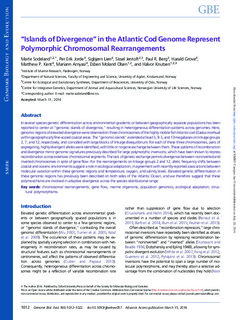| dc.description.abstract | In several species genetic differentiation across environmental gradients or between geographically separate populations has been reported to center at “genomic islands of divergence,” resulting in heterogeneous differentiation patterns across genomes. Here, genomic regions of elevated divergence were observed on three chromosomes of the highly mobile fish Atlantic cod (Gadus morhua) within geographically fine-scaled coastal areas. The “genomic islands” extended at least 5, 9.5, and 13 megabases on linkage groups 2, 7, and 12, respectively, and coincided with large blocks of linkage disequilibrium. For each of these three chromosomes, pairs of segregating, highly divergent alleles were identified, with little or no gene exchange between them. These patterns of recombination and divergence mirror genomic signatures previously described for large polymorphic inversions, which have been shown to repress recombination across extensive chromosomal segments. The lack of genetic exchange permits divergence between noninverted and inverted chromosomes in spite of gene flow. For the rearrangements on linkage groups 2 and 12, allelic frequency shifts between coastal and oceanic environments suggest a role in ecological adaptation, in agreement with recently reported associations between molecular variation within these genomic regions and temperature, oxygen, and salinity levels. Elevated genetic differentiation in these genomic regions has previously been described on both sides of the Atlantic Ocean, and we therefore suggest that these polymorphisms are involved in adaptive divergence across the species distributional range. | nb_NO |

